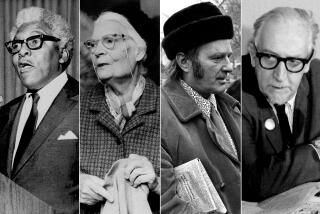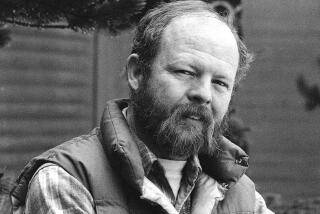David McTaggart; Co-Founded Greenpeace
- Share via
ROME — David McTaggart, one of the founders of Greenpeace International, who piloted boats into the teeth of the French navy to disrupt nuclear testing, was killed Friday in a head-on car crash on a country road in central Italy. He was 68.
Police said McTaggart was alone in his car. The driver of the other car also died and his wife was injured, police said. The accident happened in Umbria, about 20 miles from Perugia.
“Greenpeace would be unimaginable without his force of personality,” Gerd Leipold, the organization’s interim international executive director, said from Amsterdam, Netherlands.
McTaggart galvanized the international environmental movement in 1972 by leading protests against French nuclear testing in the South Pacific.
He went on to create support throughout Europe for Greenpeace, forging an alliance in 1979 among separate factions of the organization and uniting them under his chairmanship as Greenpeace International. He was chairman until 1991.
In an incident in 1995, McTaggart and two companions slipped onto the Mururoa atoll in the South Pacific in an inflatable speedboat to disrupt planned French nuclear tests and remained there for two weeks, evading French authorities. As they infiltrated the atoll, French commandos stormed their main vessel, the Rainbow Warrior II.
When he was repeatedly detained by French authorities, those confrontations helped establish Greenpeace’s reputation for fighting for the environment.
“He was the last medieval knight, capable of great symbolic acts for the environmental cause,” said Gianfranco Bologna, a spokesman in Italy for the World Wildlife Fund.
Grazia Francescato, president of the Italian Green Party, called McTaggart “a figure of extraordinary force” and “an example for all of us.”
In a 1991 article, Forbes magazine depicted him as a masterful manipulator and myth-maker who turned Greenpeace into one of the largest environmental organizations in the world and a booming business.
Outrage at French Nuclear Testing
Under his leadership, it said, Greenpeace mastered “the tools of direct mail and image manipulation” and indulged “in forms of lobbying that would bring instant condemnation if practiced by a for-profit corporation.”
McTaggart, sometimes called “the shadow warrior,” was “a very difficult person because he was extremely stubborn, extremely tough,” said David Newmann, ex-director of Greenpeace Italy, who also called him “a person of enormous courage and determination.”
Born in Vancouver, British Columbia, Canada, McTaggart was an outstanding athlete as a youth whose interests included skiing, tennis and golf. He was Canadian national champion in singles badminton three years running. After school, McTaggart worked in the construction business for 20 years, then moved to the United States in the 1960s, where he became a successful contractor and developer.
After an explosion destroyed a resort his firm had built, he retired and sailed the Pacific for pleasure. In 1971 he became outraged by the French government’s decision to cordon off a vast swath of international waters in the Pacific for nuclear tests.
McTaggart was also a driving force behind Greenpeace campaigns to save the whales, to stop the dumping of nuclear waste in the ocean, to block the production of toxic wastes, to end nuclear testing and to protect the Antarctic continent from oil and mineral exploitation.
In July 1985, during McTaggart’s tenure as chairman, the Greenpeace vessel Rainbow Warrior was sunk in a New Zealand harbor by bombs planted by French intelligence agents, causing an international uproar. A French photographer aboard the vessel, Fernando Periera, was killed. The ship was due to sail to a Pacific atoll to protest French nuclear-arms tests.
McTaggart had lived in Italy for many years and had an olive farm in Umbria. There was no immediate information on survivors or funeral arrangements.
More to Read
Inside the business of entertainment
The Wide Shot brings you news, analysis and insights on everything from streaming wars to production — and what it all means for the future.
You may occasionally receive promotional content from the Los Angeles Times.









